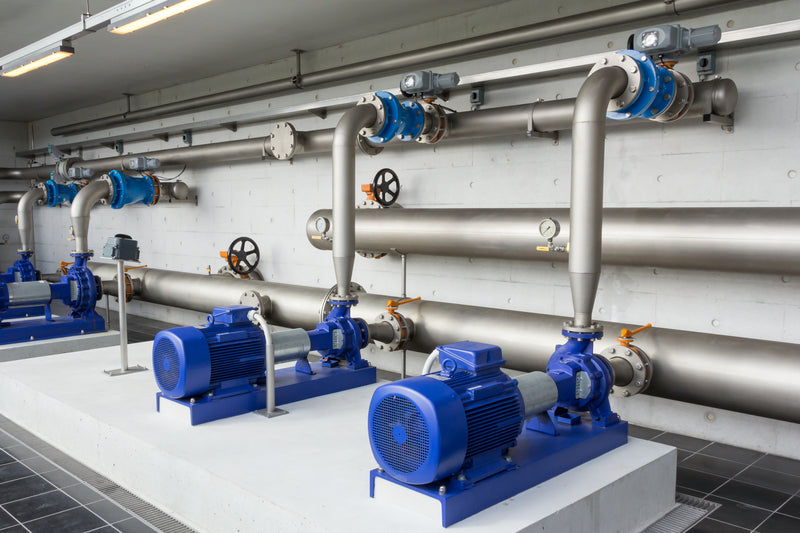
Application Guide
Process Water Filtration
Our filter bags remove suspended solids from process heating and cooling water, protect pumps, valves and heat exchangers from damage and ensure consistent quality of water used for mixing and processing.
Process water refers to water used in industrial manufacturing, heating, cooling, cleaning, mixing or other operational processes, often requiring filtration to remove contaminants such as sediments, particles, chemicals, or microorganisms. Filter bags are a popular, cost-effective solution for this purpose, consisting of porous media housed in a bag-shaped structure that traps impurities while allowing clean water to pass through. They are particularly valued for handling large volumes of liquid with high flow rates, making them suitable for various industrial settings. This article explores specific applications, common problems, key considerations, micron ratings, and types of filter bags used in process water filtration.
Why Filter Process Water?
Process water often contains suspended solids, rust, scale, sand and biological matter. If left untreated, these contaminants can:
- Damage pumps, nozzles, and heat exchangers
- Cause fouling, scaling, or corrosion in piping
- Reduce efficiency in heat transfer equipment
- Compromise product quality in food, beverage applications
Filter bags offer a simple and economical method for removing these unwanted particles.
Common Applications
- Protection of high pressure pumps
- Protection of valves and sensors
- Protection of heat exchangers
- Protection of heating and cooling circuits
- Filtration of wash/rinse water
- RO prefiltration
- Post sand filter and Ion exchange resin bed to capture fines
- Prefiltration of process water, ingredient preparation water, and cleaning-in-place (CIP) systems in food industry
- Process stream filtration
Selection Criteria
Particle Characteristics
Assess the size, shape, and concentration of contaminants in the process water to determine the required retention efficiency.
Process Conditions
Consider flow rate, operating pressure, temperature, and chemical compatibility.
Water Chemistry Compatibility
Factors to consider include pH levels, oxidizing agents, presence of solvents, and temperature. Polypropylene bags offer excellent chemical resistance across a broad pH range, while Polyester and Nylon filter bags provide good performance in high temperature applications, up to 120°C.
Temperature Requirements
Operating temperature directly impacts material selection and filtration performance. Polypropylene bags typically handle temperatures up to 80°C, while polyester and Nylon can withstand higher temperatures up to 120°C.
Flow Rate and Pressure Drop
Proper sizing requires careful consideration of flow rates, allowable pressure drop, and dirt-holding capacity. Higher flow rates may necessitate larger bag sizes or multiple bag housings to maintain acceptable pressure drop across the system.
Regulatory Requirements
Applications in food, or potable water systems require compliance with food regulations. All Polypropylene felt, Nylon Mesh and Polyester felt filter bags from CLARIBag are constructed from food safe materials. Food certificates available on Downloads page.
Micron Ratings and Filtration Efficiency
Filter bag micron ratings typically indicate nominal filtration, meaning they will remove a high percentage of particles at the stated size. Common ratings range from 1 micron for fine filtration up to 800 microns for coarse particulate removal. The actual efficiency depends on particle type, shape, and filter medium characteristics.
Polypropylene felt: 1 - 200 micron
Nylon mesh: 50 - 1000 micron
Polyester felt (High temperature 120°C): 1 - 200 micron
Coarse Filtration (100-800 microns) Nylon Mesh or Polypropylene felt: Suitable for removing large debris, pipe scale, and biological matter. Often used as primary filtration in cooling tower and surface water applications.
Medium Filtration (10-100 microns) Nylon mesh or Polypropylene felt: Effective for general suspended solids removal in most process water applications. Provides good protection for downstream equipment without excessive pressure drop.
Fine Filtration (1-10 microns) Polypropylene felt: Used for high-purity applications, membrane pre-filtration, and fine particle removal. Requires careful attention to pressure drop and bag life considerations.
Troubleshooting Common Issues
Premature Bag Failure
Causes include incorrect micron rating selection, chemical incompatibility, excessive pressure differentials, or installation errors. Systematic analysis of failure modes helps identify root causes and optimize selection criteria.
Poor Filtration Performance
Issues may stem from bag bypass, incorrect rating selection, or upstream process changes affecting particle characteristics. Regular monitoring and performance verification help identify performance degradation. Poor sealing of bags can allow unfiltered water to pass around the bag.
High Pressure Drop
Rapid pressure rise may indicate undersized bags, inappropriate micron rating, or changes in feed water characteristics. Consider system modifications or bag selection adjustments.
Chemical compatibility
Certain process streams may degrade polyester or nylon filter media, requiring polypropylene or specialty materials.
Temperature limitations
Elevated process water temperatures may exceed standard bag media ratings.

